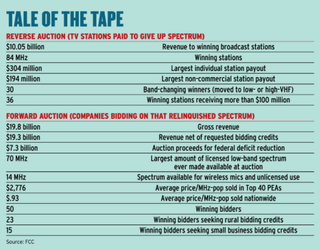Spectrum Auction Leaves Most TV Stations in Business

The FCC dumped a load of data last week on the who, how much and where of the broadcast incentive spectrum auction winners, and one of the big takeaways was that almost all broadcasters signaled they are staying in the business while reaping their collective $10 billion payout.
That includes NBC’s flagship New York station, WNBC-TV, which agreed to sell its spectrum for $214 million. If that sounds low, it is because WNBC programming will move to WNJU, sharing with the co-owned Telemundo affiliate, so NBC gets the payout and continues broadcasting. It will do the same in top 10 markets Philadelphia and Chicago, where it also has duopolies, but in those cases the Telemundo station spectrum was sold (for a total $268 million) and that programming will move to WCAU and WMAQ, respectively.
Comcast/NBCU was also a buyer in the auction, paying $1.7 billion for wireless spectrum, ranking it No. 3 behind T-Mobile ($8 billion) and Dish ($6.2 billion). Verizon did not bid.
Fox also scored with sales of WPWR spectrum in Chicago ($161 million), WDCA ($119 million) in Washington, and WMYT-TV Charlotte, N.C. ($74 million), with sharing plans in those cities as well.
While 2,200 TV stations were eligible for the auction, 1,800 remained in the running after the FCC knocked out the 400 or so stations whose spectrum it didn’t need. The commission won’t say how many stations actually participated, since it is keeping the losers confidential for another two years, but of those, the FCC only had to pay 175.
Of those, 145 are giving up their spectrum, but 133 (92%) of that group have signaled they planned to strike sharing agreements with other stations, so that while their spectrum was gone, they would still be on the air. Of the remaining 30 stations getting paid, 29 are moving from UHF to VHF channels, and one got paid to move from a high V to a low V.
So, only 12 stations said they were giving up their spectrum but did not indicate they were going to try and stay on the air via sharing.
Broadcasting & Cable Newsletter
The smarter way to stay on top of broadcasting and cable industry. Sign up below
The highest price paid for a station was $304 million for Trinity Broadcasting’s WWTO in Chicago—Trinity cashed in a number of markets.
OTA, the Michael Dell-owned group, also sold more than a half-dozen station’s worth of spectrum, while Nexstar’s tally was 10.
Also of note, CBS got $10 million for KCCO-TV Minneapolis, but plans to share, and Gray sold WAGT Augusta, the subject of a high-profile battle between Media General and Schurz, for $40 million, which is actually one of the few stations going off the air rather than sharing.
The FCC also announced new channel assignments for the 957 non-winning stations that must be repacked—change channels—to clear the spectrum for wireless winners. Stations have 39 months to finish that process starting last Thursday (April 13), when the public notice containing all that data was released. The first group of station moves will begin Nov. 30, 2018.
Contributing editor John Eggerton has been an editor and/or writer on media regulation, legislation and policy for over four decades, including covering the FCC, FTC, Congress, the major media trade associations, and the federal courts. In addition to Multichannel News and Broadcasting + Cable, his work has appeared in Radio World, TV Technology, TV Fax, This Week in Consumer Electronics, Variety and the Encyclopedia Britannica.

